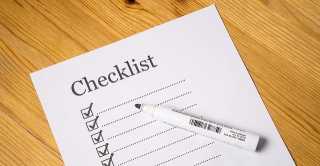

I always feel guilty, but my answer is always the same, which is grieve and spend time with your family. Nothing else needs to be done other than that at this time.
There are very few things that are immediate or that have to be done within minutes or hours after a person passes other than to spend time with your loved ones and take time to grieve the loss.
I often will provide a checklist of what needs to be done immediately and what can be done over the course of time, and I will provide that list below. What requires immediate action (of course, after grieving has occurred).
- Notify relatives and friends.
- If the person was employed at the time of the death, notify the employer.
- Locate burial or funeral instructions.
- You may want to check the Last Will and Testament, but please remember that people will often not place burial or funeral instructions in a Will because they expect that often times the Will will not be checked until after the funeral.
- Look around for pre-paid funerals or burial arrangements. If for some reason this information was in a safety deposit box the law does allow a family member, in the presence of a bank officer, to open the box to look for a Will and evidence of ownership of a burial plot or prepaid funeral.
- Make funeral arrangements. Be sure to keep track of all funeral expenses.
- Notify the executor of the estate or trustee.
- Notify the financial professional or review documents to determine if the person is required to take required minimum distributions, which is usually required by the end of the year.
Do not do any of the following:
- Open a safety deposit box in the name of the individual who passed without following the procedures in the state of which the decedent was a resident.
- Close the decedent’s bank accounts. These accounts may be part of the deceased estate, and you will be held responsible for anything that is missing.
- Take or start giving away any of the deceased persons possessions. If someone is dissatisfied with what items were given away or destroyed, the person may be held accountable. Furthermore, from a legal standpoint and for the purpose of family harmony, it is better to distribute them as part of the formal administration of the person’s estate.
After time has passed and you have completed the immediate actions as stated above, most importantly grieving and spending time with your family, then over time you can start the administration of the estate by contacting the attorney to handle the estate settlement and getting copies of all documents and notifying Social Security, et cetera.
If you have questions about this topic, or anything else regarding estate planning for you and your loved ones, fill out our simple online form and we'll be in touch. Just click here.


